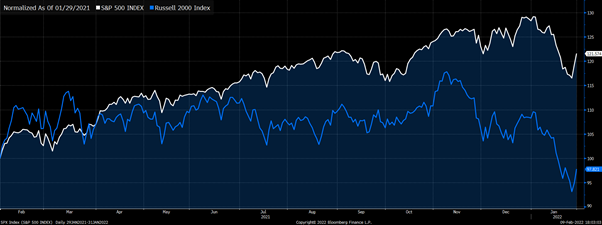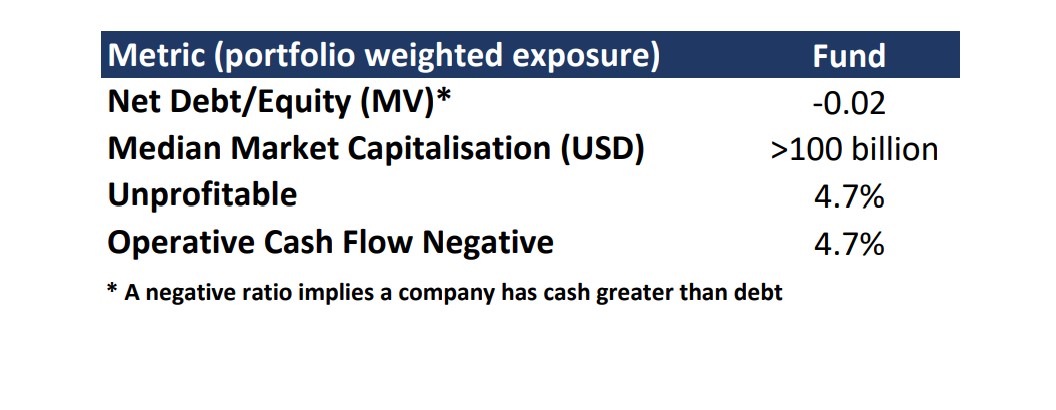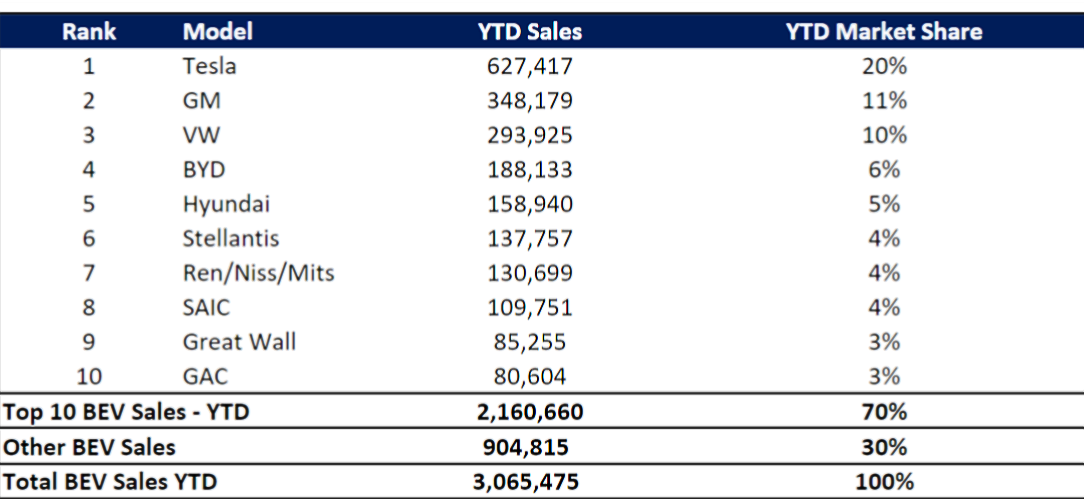
It was a bad month for markets all around, as the US Federal Reserve finally leaned into its job – getting inflation out of the system. Its mechanism for doing this is to raise rates to curtail demand. This impacts share markets in two key ways. First, relatively higher interest rates will be less stimulative for economic growth, which feeds its way through to corporate profits and therefore valuations. Second, higher interest rates mean higher costs of capital to business (debt and equity). All else equal, higher costs of capital will reduce the present value of a company’s cashflows and therefore its share price. And the further out (in time) those cashflows are, the more they are discounted, meaning that share prices of companies which are not profitable now are very badly hit.
The chart below shows -23.8% underperformance of the Russell 2000 against the S&P500 over the past year. Just over half of that underperformance was notched in the past three months. The Russell 2000 is an index of small to mid cap US companies which generally carry less financial strength – and so may be of less quality – than the larger companies that dominate the S&P500.

This is a big divergence in outcomes for higher quality companies compared with lower quality companies, but it’s even worse than that for some funds and many companies, some of which are down -50% or more.
Economic growth is only part of the story
It is more than likely that rising interest rates will temper some of the stellar growth we are seeing in companies – this is of course incrementally negative for share markets. However economic growth is not the only ingredient for success in the companies that Loftus Peak holds. We believe a larger part of the success of our holdings is driven by secular trends resulting from changing business and consumer behaviour towards better, more efficient tools and solutions. So higher interest rates might change the pace, but not the destination. It is even conceivable that some of these trends accelerate and become more ingrained during a period of depressed growth as companies look to boost profitability by cutting costs, including by automation, moving to the cloud and cutting ineffective legacy advertising.
Quality takes centre stage – profitability, cashflows, balance sheets
We never shy away from highlighting the quality of the portfolio. Irrespective of macroeconomic conditions, this has always been an integral part of the portfolio construction process, and was a decision informed by the numerous corrections and crashes the investment team has witnessed over their lifetimes.
Loftus Peak invests in disruptive companies; businesses driven by secular trends and structural change. The portfolio is therefore heavily tilted towards companies with differentiated, non-commoditised products and services, resulting in business models with relatively higher margins and better profitability. In an inflationary environment, which it appears we are heading into, greater differentiation and higher margins means the ability to pass on or even absorb increased input costs. The same cannot be said for many traditional businesses that are capital intensive and run on razor-thin margins.
A key component of a quality company is one that is generating positive cash flows and has additional cash on the books for good measure. Why is this important? As monetary policy tightens and interest rates go up, economic growth will temper at the same time the cost of capital begins to increase. This can be a lethal combination for companies that haven’t yet established their business models or a path to profitability, because plugging the hole with debt and equity raisings is going to become much more difficult (and costly).
It is for this exact reason that a majority of Loftus Peak’s holdings are in quality companies – those with established business models, strong balance sheets and cashflows, with a much lower allocation to ‘riskier’ companies. This has always been the case, but in more recent months we have increased the tilt to quality even more than usual.
The portfolio’s quality tilt
 |
We realise that our focus on quality might mean we sacrifice some additional upside when things are going well, but it also ensures our investors are protected on the downside as the dust settles and the market begins seeking out companies that are strategically positioned, with solid fundamentals, positive cashflow generation and strong balance sheets.
Despite the short-term volatility and underperformance of a select few names, we believe the Fund is well positioned for a period marked by slowing economic growth and rising costs of capital because of the inherent characteristics of disruptive companies and our portfolio construction process, which leans heavily toward strong balance sheets and business models, so is high on quality.
Despite macro headwinds, disruption marches on… For Tesla, competitors are coming
Tesla is currently valued at more than double that of the entire global car industry (excluding itself, or course). While not wishing to in any way minimise Elon Musk’s inestimable impact on these car makers (and the fossil fuels on which they run) it is simply not credible that the existing industry will not fight back. The table below shows the market share of the top ten car makers by production of electric vehicles. Generally, these sales represent only a small fraction of the car companies’ overall output across internal combustion engines, but the takeaway is simple – Tesla has just 20% of the total market share in EV’s worldwide.

Take VW as an example, which since we wrote in our piece title “VW’s car accident; don’t waste a crisis” in Sept 2015, now has 10% of the battery electric vehicle market share. The company has not one but two battery technology pioneer companies in its orbit – Quantumscape and its US 24M, the latter of which is reportedly capable of energy density (kilowatt hours/kilogram) around 50% higher than Tesla. As we said in our piece .
Another data point: The Wall Street Journal in January carried a review of BMW’s new electric 4 series. “After a couple hundred kilometers soaring across Bavarian fairyland, here’s my capsule review: glorious. Sweet, swift, swank, swell, fast as hell, hushed as a chapel, cool as marble. With its front and rear e-motors providing a digitally mastered 536 hp to the wheels, the i4 M50 accelerates like Derby Lane’s electric rabbit—0-60 mph in 3.7 seconds. It’s too bad earlier generations of car reviewers have squandered the phrase “corners like it’s on rails,” because the i4 M50 really does.”

December quarter earnings highlight the resilience of secular trends
Last month we wrote extensively on the importance of semiconductors as the bedrock for much of the disruption and secular trends we are witnessing. Since then, many of our semiconductor companies have reported strong results driven by robust demand in their respective end markets (consumer – phones, cars, other devices – industrials and more). Many of our other core holdings – still beneficiaries of semiconductor advances – such as Apple, Amazon, Google and Microsoft all reported results that beat the market’s subdued expectations.
It is positive results like these that add to the conviction we have in the long-term secular trends we are exposing our clients to. Although the short term might remain volatile and uncertain, we believe that over the medium and long term the safest place to be is in quality companies riding secular tailwinds.
As a reminder, those secular tailwinds include 5G and the Internet of Things, cloud computing, digital advertising, ecommerce, streaming, electrification and importantly the semiconductors underpinning it all. We do not believe the strong results will end here.
Share this Post


